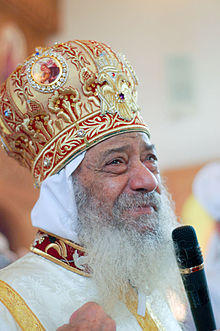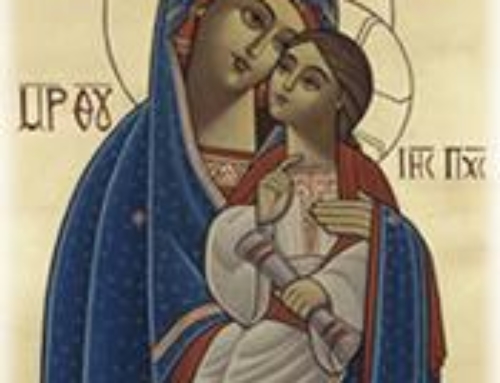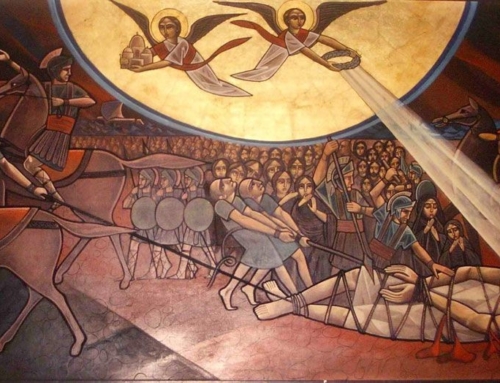
Epiphany is one of the Major Lordly Feasts of the Coptic Orthodox Church, standing shoulder to shoulder with the great feasts of Nativity and Easter.
During this feast, the church celebrates the baptism of our Lord and Saviour Jesus Christ by St. John the Baptist. The word “Epiphany” comes from the Greek word ‘epiphaneia’, meaning ‘manifestation’ especially that of a deity to a worshiper (Theophany). This refers to the event in which the three persons of The Holy Trinity revealed Himself to mankind in the baptism of our Lord. The Son being baptised, the Father calling from heaven above and The Holy Spirit appearing in the shape of a dove and resting on the Son.
As a slight aside, it is traditional in Egyptian Coptic families to celebrate this feast with a dish of Kolkas – “Taro-Root”. Kolkas grows underground and is slightly poisonous if not peeled of its outer brown layer revealing the white inner part of the vegetable (Purity). This would then need to be washed well under water (Baptism). It is traditionally sautéed in green coriander leaves (don’t know significance of this but my mother makes this taste great!)
 H.H. the late Pope Shenouda III wrote in his book “Meditations upon the glorious feast of Epiphany” –
H.H. the late Pope Shenouda III wrote in his book “Meditations upon the glorious feast of Epiphany” –
The feast of Epiphany is the feast of Baptism – This feast is also called the feast of the divine manifestation (the Theophania).
Because the Holy Trinity appeared in it: The Son is baptised, The Father says from heaven: “This is My beloved Son, in whom I am well pleased”, and The Holy Spirit appears “like of a dove” (Matt. 3: 16-17). Hence the baptism of the Lord Christ shows the creed of the Holy Trinity. Thus the baptism is always in the Name of the Holy Trinity, according to the word of the Lord to His disciples before His Ascension: “Go therefore and make disciples of all the nations, baptizing them in the name of the Father and of the Son and of the Holy Spirit” (Matt. 28:19). He did not say in the names, because the three are one, as it was mentioned in (1 John 5:7): “For there are three that bear witness in heaven: the Father, the Word, and the Holy Spirit; and these three are one”.
Verily the Baptism’s story is full of numerous examples of humility.
Also because of the Lord’s humility, after all the glorious matters that appeared during His baptism, and the coming of the Holy Spirit, and the testimony of John ……. after all this “He went up on a mountain”, in order to be tempted by Satan, and permitted Satan to tempt Him, in all audacity, or more accurately speaking, in all pride …… and the Lord replied to him in all quietness, and defeated Satan with His humility ……
Also because of the humility of the Lord, He submitted to the Law in age as well as in baptism.
He waited till He reached the age of thirty according to the Law; while it was so easy for Him to begin many years before that, He who at the age of twelve, amazed the old teachers, “and all who heard Him were astonished at His understanding and answers” (Luke 2:47) …… But He waited till the age of thirty, and waited till He was baptized, and till He passed a period of solitude upon the mountain ……and then He began working ……
Christ humbled Himself from the beginning of His mission, in order to reply to the sin of the first Adam.
The first Adam responded to the incitement to become like God (Gen 3:5). That was undoubtedly a kind of pride. Then the Lord Christ the Son of God came, “taking the form of a bondservant, and coming in the likeness of men” (Philippians 2:7), walking in humility, in His birth in a manger representing poverty (Luke 2: 7), and also in His baptism at the hands of John who was in need to be baptized by Him

“The Epiphany or the Baptism of Christ on Tobah 11, c. January 19 is connected with Christmas and the circumcision feasts. For on Christmas, the Word of God took what is ours (our humanity) and in the “circumcision” He subjected Himself to the Law as He became one of us, but in the Epiphany. He offered us what is His own. By His incarnation He became a true man while He still being the Only-begotten Son of God, and by baptism we became children of God in Him while we are human being. In this feast, the liturgy of blessing the water is conducted, and the priest blesses the people by the water on their foreheads and hands to commemorate baptism.” – “Introduction to the Coptic Orthdodox Church”
 St. John Chrysostom writes in his discourse on the day of the Baptism of Christ,
St. John Chrysostom writes in his discourse on the day of the Baptism of Christ,
“Why then is this day called Theophany? Because Christ made Himself known to all—not then when He was born—but then when He was baptized. Until this time He was not known to the people. And that the people did not know Him, Who He was, listen about this to John the Baptist, who says: Amidst you standeth, Him Whom ye know not of (Jn.1:26). And is it surprising that others did not know Him when even the Baptist did not know Him until that day? And I—said he—knew Him not: but He that did send me to baptize with water, about This One did tell unto me: over Him that shalt see the Spirit descending and abiding upon Him, This One it is Who baptizeth in the Holy Spirit (Jn. 1:33).”
St. John carries on and explains two reasons for our Lord to be Basptised of John –
“There was a Jewish baptism, which cleansed from bodily impurities but not to remove sins. Thus, whoever committed adultery, or decided on thievery, or who did some other kind of misdeed, it did not free him from guilt. But whoever touched the bones of the dead, whoever tasted food forbidden by the law, whoever approached from contamination, whoever consorted with lepers—that one washed, and until evening was impure, and then cleansed. Let one wash his body in pure water—it says in the Scriptures,—and he will be unclean until evening, and then he will be clean (Lev 15:5, 22:4). This was not truly of sins or impurities, but since the Jews lacked perfection, then God, accomplishing it by means of this greater piety, prepared them by their beginnings for a precise observance of important things. Thus, Jewish cleansings did not free from sins, but only from bodily impurities. Not so with ours: it is far more sublime and it manifests a great grace, whereby it sets free from sin, it cleanses the spirit and bestows the gifts of the Spirit.
And the baptism of John was far more sublime than the Jewish but less so than ours: it was like a bridge between both baptisms, leading across itself from the first to the last. Wherefore John did not give guidance for the observance of bodily purifications, but together with them he exhorted and advised to be converted from vice to good deeds and to trust in the hope of salvation and the accomplishing of good deeds, rather than in different washings and purifications by water. John did not say: wash your clothes, wash your body, and ye will be pure, but what?—Bear ye fruits worthy of repentance (Mt 3:8).
Since it was more than of the Jews, but less than ours: the baptism of John did not impart the Holy Spirit and it did not grant forgiveness by grace: it gave the commandment to repent, but it was powerless to absolve sins. Wherefore John did also say: I baptize you with water…That One, however, will baptize you with the Holy Spirit and with fire (Mt 3:11). Obviously, he did not baptize with the Spirit. But what does this mean: with the Holy Spirit and with fire? Call to mind that day, on which for the Apostles There appeared disparate tongues like fire, and sat over each one of them (Acts 2:3).
And that the baptism of John did not impart the Spirit and remission of sins is evident from the following: Paul found certain disciples, and said to them: received ye the Holy Spirit since ye have believed? They said to him: but furthermore whether it be of the Holy Spirit, we shall hear. He said to them: into what were ye baptized? They answered: into the baptism of John. Paul then said: John indeed baptized with the baptism of repentance—repentance, but not remission of sins; for whom did he baptise? Having proclaimed to the people, that they should believe in the One coming after him, namely, Christ Jesus. Having heard this, they were baptised in the Name of the Lord Jesus: and Paul laying his hands on them, the Holy Spirit came upon them (Acts 19:1-6).
Do you see, how incomplete was the baptism of John? If the one were not incomplete, would then Paul have baptised them again, and placed his hands on them; having performed also the second, he shew the superiority of the apostolic Baptism and that the baptism of John was far less than his. Thus, from this, we recognize the difference of the baptisms.
Now it is necessary to say, for whom was Christ baptized and by which baptism? Neither the former the Jewish, nor the last—ours. Whence hath He need for remission of sins, how is this possible for Him, Who hath not any sins? Of sin,—it says in the Scriptures,—worked He not, nor was there deceit found in His mouth (1 Pet 2:22); and further, Who of you convicteth Me of Sin? (Jn 8:46). And His flesh was privy to the Holy Spirit; how might this be possible, when it, in the beginning, was fashioned by the Holy Spirit? And so, if His flesh was privy to the Holy Spirit, and He was not subject to sins, then for whom was He baptized?
But first of all, it is necessary for us to recognize, by which baptism He was baptized, and then it will be clear to us. By which baptism indeed was He baptised?—Not the Jewish, nor ours, nor John’s.
For whom, since thou from thine own aspect of baptism dost perceive, that He was baptized not by reason of sin and not having need of the gift of the Spirit; therefore, as we have demonstrated, this baptism was alien to the one and to the other. Hence it is evident, that He came to Jordan not for the forgiveness of sins and not for receiving the gifts of the Spirit.
But so that some from those present then should not think, that He came for repentance like others, listen to how John precluded this. What he then spoke to the others then was: Bear ye fruits worthy of repentance; but listen what he said to Him: I have need to be baptised of Thee, and Thou art come to me? (Mt 3:8, 14). With these words he demonstrated, that Christ came to him not through that need with which people came, and that He was so far from the need to be baptised for this reason—so much more sublime and perfectly purer than Baptism itself.
For whom was He baptised, if this was done not for repentance, nor for the remission of sins, nor for receiving the gifts of the Spirit? Through the other two reasons, of which about the one the disciple speaks, and about the other He Himself spoke to John. Which reason of this baptism did John declare? Namely, that Christ should become known to the people, as Paul also mentions: John, therefore, baptized with the baptism of repentance so that through him they should believe on Him that cometh (Acts 19:4); this was the consequence of the baptism. If John had gone to the home of each and, standing at the door, had spoken out for Christ and said: He is the Son of God, such a testimony would have been suspicious, and this deed would have been extremely perplexing. So too, if he in advocating Christ had gone into the synagogues and witnessed to Him, this testimony of his might be suspiciously fabricated. But when all the people thronged out from all the cities to Jordan and remained on the banks of the river, and when He Himself came to be baptised and received the testimony of the Father by a voice from above and by the coming-upon of the Spirit in the form of a dove, then the testimony of John about Him was made beyond all questioning. And since he said: and I knew Him not (Jn 1:31), his testimony put forth is trustworthy.
And the second reason:
And there is a second reason, about which He Himself spoke—what exactly is it? When John said: I have the need to be baptized of Thee, and Thou art come to me?—He answered thus: Stay now, for thus it becometh us to fulfill every righteousness (Mt 3:14-15). Dost thou see the meekness of the servant? Dost thou see the humility of the Master? What does He mean: To fulfill every righteousness? By righteousness is meant the fulfillment of all the commandments, as is said: Both were righteous, walking faultlessly in the commandments of the Lord (Lk 1:6). Since fulfilling this righteousness was necessary for all people—but no one of them kept it or fulfilled it—Christ came then and fulfilled this righteousness.
And what righteousness is there, someone will say, in being baptised? Obedience for a prophet was righteous. As Christ was circumcised, offered sacrifice, kept the sabbath and observed the Jewish feasts, so also He added this remaining thing, that He was obedient to having been baptised by a prophet. It was the will of God then, that all should be baptised—about which listen, as John speaks: He having sent me to baptise with water (Jn 1:33); so also Christ: The publicans and the people do justify God, having been baptised with the baptism of John; the Pharisees and the lawyers reject the counsel of God concerning themselves, not having been baptised by him (Lk 7:29-30). Thus, if obedience to God constitutes righteousness, and God sent John to baptize the nation, then Christ has also fulfilled this along with all the other commandments.
Ehab Roufail







